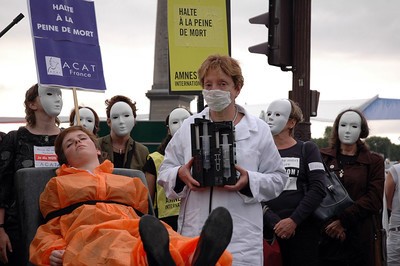Kenneth Smith, 58, was convicted for a murder-for-hire committed in 1988, and sentenced to death. He is now scheduled for execution in the state of Alabama on Jan. 25. This would be the first execution by nitrogen gas in the United States.

Most U.S. executions are performed using lethal doses of a barbiturate. Barbiturates are a class of depressant drugs that are chemically derived from barbituric acid. They are prescribed to treat headaches, insomnia, and seizures. In Smith's case, the procedure is intended to deprive him of oxygen by using a face mask connected to a cylinder of nitrogen.
In a statement obtained by Reuters, four U.N. Special Rapporteurs said the method could cause "grave suffering" and likely be at odds with the prohibition on torture and other cruel, inhuman or degrading punishment. "We are concerned that nitrogen hypoxia would result in a painful and humiliating death," they warned.
The United Nations experts have pressed the U.S. to halt its plans to use nitrogen hypoxia to kill inmate, Kenneth Smith. The Independent noted Smith's legal team also share similar concerns, specifically pointing to the US ban on "cruel and unusual punishments" as reason enough not to go ahead with the execution. After a mishandled execution involving Smith in 2022, any attempt to end his life should be deemed unconstitutional, said the legal team.
The same Reuters article went on to reveal that Smith is one of two people alive in the U.S. who has survived an execution attempt via lethal injection. Officials tried and failed to administer the drugs despite there being a court order in place to block the execution.
States that continue to authorize capital punishment have struggled in recent years to access the chemicals needed to effectively carry out lethal injection executions. This mainly stems from an agreement implemented by the European Union that bans the sale, as The Independent also revealed, of the required chemicals to the U.S. if they are intended for executions. Nitrogen hypoxia has not been tested as a method of execution. According to Forbes, experts have warned that there is "no scientific evidence" proving it will not cause "grave suffering."
A federal judge is weighing whether to permit Smith's execution to proceed after hearing arguments from Alabama and Smith. Lawyers for the state dismissed Smith's concerns of distress and suffering, also touching on the potential of Smith falling into a vegetative state from the drug. They shut down such concerns citing the bans on cruel or unusual punishments do not prohibit all pain.
It is not clear when the judge will rule on the case.









